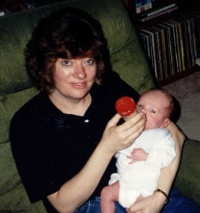As those of you who are familiar with Postpartum Advocacy know, Mary Jo has worked tirelessly to increase awareness and education of those around her. In fact, along with her husband, former NJ Governor Ritchie Codey, Mary Jo aided in passing New Jersey’s state-wide legislation for Postpartum Mood Disorder Screening education and screening. She also strongly advocates for the passage of The MOTHER’S Act, a bill that will increase funding for research, education, and awareness of Postpartum Mood Disorders here in the United States. Mary Jo has graciously agreed to Share her Journey today with the hopes of increasing signatures to the Perinatal Pro list as well as calls to the Senate H.E.L.P. Committee.
I sincerely hope her words will help spur you into action. Let me put it this way. If you know ten mothers, at least eight of them have experienced the Baby Blues. Two of them have experienced full-blown Postpartum Depression. And these are only the ones we know about. How many other mothers have suffered in silence? Help them break the silence. Let them know you are on their side. As New Jersey’s campaign says – “Speak Up when you’re Down!”
 Tell us a little bit about yourself. Who is Mary Jo Codey when she’s not passionately speaking out about Postpartum Mood Disorders?
Tell us a little bit about yourself. Who is Mary Jo Codey when she’s not passionately speaking out about Postpartum Mood Disorders?
I’m a teacher at the Gregory Elementary School in West Orange NJ. I love spending time with the children, watching them grow and flourish, and to instill a good self concept about themselves so they can take with them and utilize throughout their lives. When I’m not teaching I love to spend time with my husband Ritchie and my two boy’s, Kevin and Christopher. I also enjoy gardening, playing golf and eating chocolate with my dear friend Sylvia!
In 1984, after the birth of your first son, you began to experience some very frightening thoughts and moods. Would you share with us what you went through?
After the birth of my first child, Kevin, I had terrifying thoughts about hurting him. I had intrusive thoughts about smothering and drowning him. Those scary thoughts raced in my mind over and over throughout the day and night. It caused me such a great deal of pain and shame.
After the birth of your second son, with the aid of medication, you were able to have a “normal” experience. Describe the differences. At any point during this second postpartum period, did you find yourself upset about having missed out on your first son’s infancy?
With the birth of my first son Kevin, I had no idea what postpartum depression was. I never even heard those words before. I couldn’t even get out of my bed to visit the nursery to see or feed him.
With the birth of my second son Christopher, I was immediately put on medication which were extremely effective. I was elated that I could care for him and take care of him. I did however feel cheated by postpartum depression with my first child. At times I mourned and felt guilt for missing the first years with Kevin. I remember reporters coming to my home to do a story on me and I was asked if I had any pictures of Kevin. I was ashamed that I could not provide them with one picture of him.
When you first talked with your sons about Postpartum Mood Disorders, what did you tell them? How have they handled knowing about your experience?
I started to talk to my boys about my experience with postpartum depression at a very young age. I made sure that they understood that, it wasn’t their fault and that I loved them more than they could ever imagine. I explained to them that I was sick at the time. I also told them that they were the two greatest gifts that God had given me. They’ve handled it remarkably well.
New Jersey is the first state to enact legislation for Postpartum Mood Disorder screening and education. How did this law come about and what was your involvement in it’s development?
The minute Ritchie became Acting Governor for New Jersey the first item on our agenda was postpartum depression. Which led to “Speak Up When You’re Down.” It encourages women and their families to talk openly with each other and with their health-care provider if they are feeling depressed after the birth of their child. It also provides a 24/7 PPD Help line and postpartum depression information and resources; 1-888-404-7763.
Name three things that made you laugh today.
Watching my friend Phyllis come out of her home with 5 dog’s on leashes and luggage as we were leaving for the airport!
Trying to get on a large tube for “The Rapid River Ride.” After numerous failed attempts trying to get myself positioned on the tube, a stranger approached me and shoved me on the tube finally! He said that he couldn’t stand watching me struggle anymore…well it finally worked!
Calling my friend Sylvia and listening her imitate her Sicilian mother on the phone. Every time she imitates her mom it literally slays me!! It leaves me in stitches!
Senator Robert Menendez, NJ, introduced The MOTHER’S Act earlier this year to Congress. Share with us what this bill would do for women and families.
This bill is so very crucial for all women and families suffering with postpartum depression. It will help provide support services to women suffering from postpartum depression and psychosis and will also help educate mothers and their families about these conditions. In addition, it will support research into the causes, diagnoses and treatments for postpartum depression and psychosis.
Stigma plays a large role in women not reporting symptoms of Postpartum Mood Disorders. What can we do to overcome this stigma and replace it with acceptance and compassion?
Having women share their experience with postpartum depression, rather than keeping it to themselves is very important. To not be ashamed or afraid to speak up to their family members, health providers and women’s groups when they are grappling with postpartum depression. This will help replace the stigma of postpartum depression with acceptance and compassion.
How did your husband handle the changes your struggle with Postpartum Mood Disorder brought into the home? What can new dads do to support their wives as they fight to move back to “normal”?
At first my husband Ritchie blamed himself for what I was going through. He thought it was because he didn’t pay much attention to me because he was too involved with sports. He couldn’t understand what and why I was going through this. He was angry that I asked him to find another wife when I went to the hospital because I believed that I wasn’t going to get better. He never gave up on me! He stayed with me and understood that postpartum was an illness that we were going to overcome as a family. He never stopped praying. New dads need to be supportive and understanding towards their wife who is suffering with postpartum depression. Most importantly, they need to be patient and compassionate.
Last but not least, if you had the opportunity to give an expectant mother (new or experienced) just one piece of advice about Postpartum Mood Disorders, what would you tell her?
Women suffering with postpartum depression need to know that they are GREAT MOTHER’S! Do not worry about not being able to bond with your baby, it will happen. First you need to get well. Most importantly please, please, please don’t be afraid to reach out for help.




 Meet
Meet  Now I’d like to provide a different point of view. A mom is not the only one affected by a Postpartum Mood Disorder. Her husband is also affected.
Now I’d like to provide a different point of view. A mom is not the only one affected by a Postpartum Mood Disorder. Her husband is also affected.  Tell us a little bit about yourself. Who is Mary Jo Codey when she’s not passionately speaking out about Postpartum Mood Disorders?
Tell us a little bit about yourself. Who is Mary Jo Codey when she’s not passionately speaking out about Postpartum Mood Disorders?